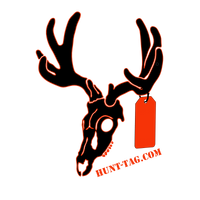
Turkey Tags: A Hunter’s Guide to Tagging and Conservation
Turkey hunting is an exciting experience that many people love. But it's important to be responsible and help conserve these amazing birds.
In this blog, we'll explore turkey tags and how they play a crucial role in hunting regulations and preserving turkey populations.
Understanding Turkey Tags
Turkey tags are like permission slips for hunters on a turkey hunting expedition. But they are more than pieces of paper. They help wildlife experts keep track of the turkey population. It ensures that hunting is done responsibly.
Hunting Tags and Regulations
Before heading out into the woods, knowing the rules is essential. Different tags exist for various seasons, such as Spring and Fall. These hunting tags can be either General or Limited Entry tags.
Understanding these distinctions will help you follow hunting regulations. It will also contribute to the well-being of the turkey population.
Acquisition Process for Tags
Obtaining a turkey tag involves several methods, each with its own set of guidelines:
- Application for Limited Tags. In some regions, turkey tags are issued through an application process. Hunters must apply within a set timeframe before the season starts.
- Draw System Participation. Many states allocate turkey tags through a lottery system. Hunters enter the draw and, if selected, receive a tag. It's important to know the deadlines and specific requirements for these draws.
- Over-the-Counter Tags. T tags might be purchased directly at hunting stores or conservation offices in areas with higher turkey populations. Availability can vary, so checking in advance is recommended.
Knowing these procedures ensures you're prepared and compliant for your turkey hunting trip.
Importance of Conservation in Turkey Hunting
Conservation is like being a superhero for nature. By understanding the impact of conservation on turkey populations, you become a guardian of the wild.
Conservation organizations play a crucial role, and we teach you how you can be a part of the efforts to protect these beautiful birds.
- Adopt Sustainable Hunting Practices. Follow bag limits and hunt only in designated seasons to support the health and ecosystem balance of the turkey population.
- Engage in Habitat Restoration. Participate in projects to restore turkey habitats. This could include planting native vegetation and maintaining water sources.
- Educate and Spread Awareness. Share knowledge about turkey conservation with others. Encourage community-wide sustainable hunting and habitat preservation efforts.
Selecting the Right Equipment for Turkey Hunting
When preparing for turkey hunting, choosing the correct equipment is crucial.
- Start with an accurate and powerful shotgun, and remember the right choke to ensure your shots hit the mark.
- Wear camouflage clothing to stay hidden, and add a turkey call to your gear to make the right sounds.
- Using decoys can also help attract turkeys. Consider using a good hunting blind for better concealment during your hunt.
Planning a Successful Turkey Hunt
Successful turkey hunting starts with a solid plan.
- First, scout the hunting area to understand turkey patterns. Look for potential roosting sites.
- Develop a strategic hunt plan. Consider weather conditions, wind direction, and the lay of the land.
- Choose a hunting spot with good visibility and natural cover.
A well-planned approach sets the stage for a successful turkey-hunting adventure. It also makes the adventure enjoyable.
Tagging Techniques and Best Practices
Once you have your turkey tag, knowing how to use it is crucial. Effective tagging techniques are a vital aspect of responsible turkey hunting. Once you've harvested a turkey, attach the tag to the bird's leg and ensure all required information, like harvest date and location, is filled out.
Adhere to local regulations for tagging and reporting. It will help contribute to effective wildlife management. Responsible tagging is not only a legal requirement but also plays a role in maintaining healthy turkey populations.
Ethics and Responsibility in Turkey Hunting
Ethical behavior and responsibility play a crucial role in turkey hunting. Following all hunting laws and regulations is essential to ensure a fair and sustainable experience.
- Respect the environment and other hunters by adhering to ethical practices, such as proper disposal of trash and minimizing noise disturbance.
- Make responsible shot choices, aiming for clean and humane kills. Additionally, practice patience and sportsmanship and always prioritize safety.
By embodying these values, you contribute to preserving the sport and the well-being of the turkey population. Turkey hunting is more than an exhilarating experience; it's an opportunity to be a responsible guardian of the wild.
Every step matters, from understanding turkey tags to adopting ethical practices and participating in conservation. For more information on hunting tags and related topics, visit Hunt-Tag. If you have further inquiries or need help, please contact us.




